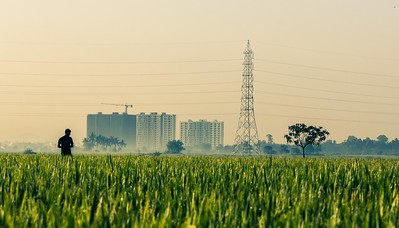FAO, in collaboration with RUAF engages with national and local governments and local food actors to build resilient city region food systems (CRFS).
It works on strengthening rural-urban linkages by providing assistance in improving the resilience of food systems and livelihoods in a given territory to climate and health risks. The programme works on operationalizing the linkages between Sustainable Development Goal (SDG) 2 (food security, nutrition and sustainable agriculture), SDG 11 (inclusive, safe, resilient and sustainable cities), SDG 12 (sustainable production and consumption) along with several of the other SDGs.
Aligned with building sustainable and resilient city region food systems (CRFS), the circular bioeconomy is attracting significant interest as an approach to stimulate economic growth and end dependency on non-renewable resources. While small scale projects can provide economic opportunities for youth and disadvantaged groups in rural and peri-urban areas, scaled up, the environmental, social and economic benefits to the city region can be transformational.
Overcoming barriers to building the circular bioeconomy
However, the development of the circular bioeconomy faces a number of barriers, such as inflexible regulatory frameworks, safety concerns and potential risks, and logistical challenges.
As part of the CRFS Knowledge Exchange Series, the Food and Agriculture Organization of the United Nations (FAO), the RUAF Global Partnership on Sustainable Urban Agriculture and FoodSystems and the CGIAR Initiative on Resilient Cities, are organizing a webinar in order to:
- take stock of the state of circular bioeconomy development in various city region contexts around the world;
- identify common barriers to adoption of circular bioeconomy approaches;
- and explore how policies can create an enabling environment that helps overcome these barriers.
The main language of the event will be English, with interpretation available in French and Spanish.
Programme
14.00 – 14.08 Welcome and introduction by Silvia Alonso, Co-lead of the CGIAR Resilient Cities Initiative, International Livestock Research Institute
14.08 – 14.50 Speakers:
The investment climate for circular bioeconomy in low-and middle income countries: Dr. Susanne Bodach, Researcher for Circular Economy and Business Management, International Water Management Institute
Regulatory barriers, health issues and safety issues: tbc
Logistics and access to resources: Hervé Levite, Office of Climate Change, Biodiversity and Environment, FAO
Multi-stakeholder platforms for promoting innovations in the circular bioeconomy: Dzifa Agbefu, CBE Innovation Hub Coordinator, IWMI Ghana
14.50 – 15.10 Roundtable discussion: How to move from a handful of circular bioeconomy projects in a city region, to policy frameworks that create an enabling environment?
Francis Ian L. Agatep, Climate Change Adaptation Division FoodSecurity & Biodiversity, Quezon City, The Philippines
Patrick Muiruri, Food Systems Officer, Nairobi City County
15.10 – 15.25 Q&A Session
15.25 – 15.30 Closing remarks by Jess Halliday, Chief Executive, RUAF
The webinar will be facilitated by Guido Santini, CRFS Programme Coordinator, FAO
